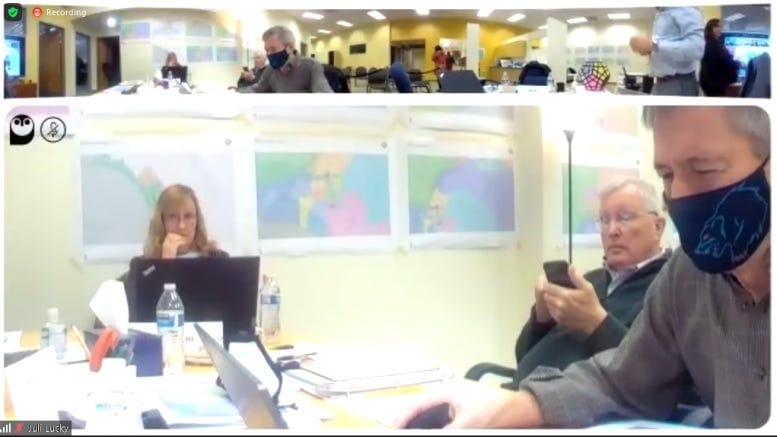Redistricting Board's conservatives vote to appeal ruling that found they can't ignore public input
"We really owe it to the people of Alaska."

Good evening, Alaska!
In this edition: The Alaska Redistricting Board’s conservatives voted to appeal Judge Thomas Matthews’ opinion, which found they implemented a “secretive process” and improperly “believed they knew better than the people,” to the Alaska Supreme Court, arguing that “We really owe it to the people of Alaska” to do so (three other plaintiffs did, too, including one that won); A refresher on the alternative for the East Anchorage senate pairings; A laughable overtime defense of the East Anchorage Senate pairings; Anchorage Assemblymember Christopher Constant has joined the race for Congress; and Gov. Mike Dunleavy notched a win in court today when a judge ruled that he can, in fact, liquidate the Higher Education Investment Fund, throwing the future of the state’s scholarship program into uncertainty or, at the very least, onto the bargaining table.
Spice level: 🌶️🌶️
Correction to this edition: The Calista Corporation and East Anchorage plaintiffs have not filed appeals, yet.
‘We owe it to the people of Alaska (to appeal a ruling that says we have to listen to them)’

Alaska Redistricting Board members Bethany Marcum, Budd Simpson and John Binkley (chair) moments before they would approve a plan for Senate pairings that boosts Eagle River’s representation at the cost of minority communities during the Nov. 9, 2021 meeting.
“We really owe it to the people of Alaska,” said Board Member Budd Simpson, a Juneau Republican who was singled out in a ruling that found his “personal views and opinions are entitled to no additional constitutional deference,” before voting to appeal the ruling to the Alaska Supreme Court.
The Alaska Redistricting Board’s conservative majority voted on Wednesday to appeal a Superior Court ruling that invalidated two key decisions due to the board’s failure even attempt to incorporate public testimony into their maps.
Judge Thomas Matthews ruled the board’s final maps met the basic constitutional criteria for redistricting—finding that they were compact, contiguous, relatively socioeconomically integrated and with minimal deviation from the ideal district population—but struck down two areas where he found that the board made no effort to incorporate public input in the maps, instead relying on a “secretive process” that elevated the board members’ personal and political goals.
The order strikes down the conservative majority’s decision to split Eagle River into a pair of Senate districts that the conservative community was expected to easily control as well as the decision to split Juneau’s relatively conservative Mendenhall Valley across two House districts. In both cases, the public testimony was nearly unanimously opposed to the actions, but the board’s majority went with the wishes of its conservative members with no attempts to even explain why accommodating the public wishes was not feasible (as they had done with several other areas in question).
“This court finds that the board’s refusal to consider and make a good-faith effort to incorporate public feedback relating to the placement of Skagway and the dividing line in Juneau was arbitrary and capricious, and thus unreasonable,” Matthews wrote in his order. “The same holds true for the East Anchorage senate pairings. If the board could simply ignore the preponderance of public testimony and make decisions based on a single member’s personal views, then Section 10 (of the Alaska Constitution that requires public input on redistricting) would be rendered superfluous.”
At a meeting on Wednesday, Alaska Redistricting Board attorney Matt Singer accused Judge Matthews of inventing a new standard and a new rule of law that, if let stand, would draw more people to testify (oh, the horror!).
“It would probably change this process going forward. It might, for example, encourage interest groups to spend more effort on rallying people to come testify as to particular issues that are important to that group,” he said. “You could see the public testimony of this process take on a heightened role.”
Singer seemed to suggest that the ruling would elevate the public input over everything else in the process. That’s not actually the standard that Judge Matthews used. Instead, he ruled the board must incorporate the public testimony or, at the very least, take a hard look at the requests and make a good-faith effort to incorporate them. The board did just that with Valdez, which was challenging its connection with the Mat-Su Borough, by exploring several alternatives before conceding it wasn’t possible to accommodate the public’s wishes without violating the constitution.
Board members Nicole Borromeo and Melanie Bahnke—who had both been critical of the board’s decision-making process around the East Anchorage Senate pairings—argued the board should let the ruling stand. Borromeo, a lawyer for the Alaska Federation of Natives, said she found the ruling to be well-reasoned and sound. Both she and Bahnke worried an appeal would be both a waste of time and money.
“We can save the state some money in litigation. The fixes are easy. I had a proposed map that could be easily adopted for the Senate pairings that shouldn’t take us too long if we reconsider that map. The Juneau fix is simple enough, too,” she said. “It would be great if we don’t impede the election process by delaying those actions. I think the Supreme Court will ultimately tell us to do the same thing.”
This content is for Paid Members
Unlock full access to The Alaska Memo and see the entire library of members-only content.
SubscribeAlready have an account? Log in



